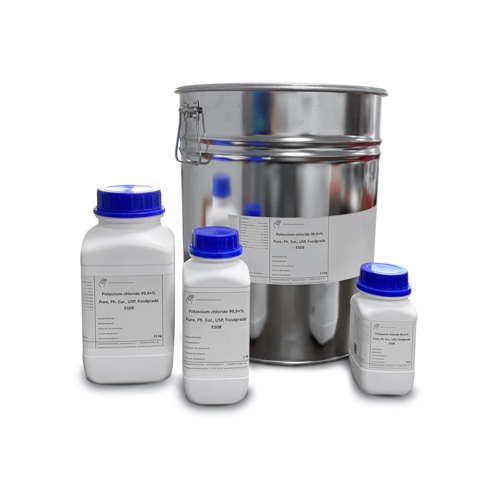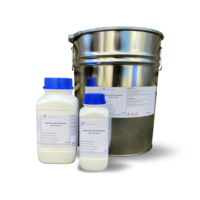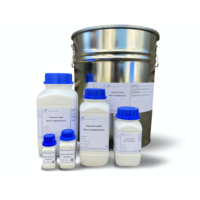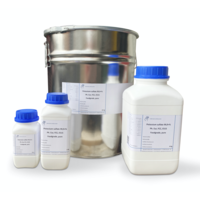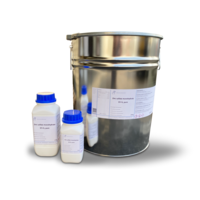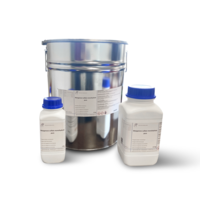You have no items in your shopping cart
Potassium Chloride 99.9 +% pure, Ph. Eur., USP, food grade
- Buy 2 and save 5%
- Buy 6 and save 10%
Potassium chloride (KCl), the potassium salt of hydrochloric acid, forms colorless, salty-bitter tasting, water-soluble crystals with a melting point of 773 ° C and a density of 1.98 g / cm3. It dissolves up to 347 g · l - 1 in water at 20 ° C. As a mineral it is called sylvin. The substance is included in the WHO list of essential medicines.
-use
Potassium chloride is used in food technology as a firming agent and flavor enhancer. It is authorized in the EU as a food additive with the number E 508 without limitation of the maximum amount (quantum satis) for all foods approved as an additive. It is also used as a constituent of artificial table salt, e.g. B. Pansalz, to reduce sodium chloride.
Potassium chloride is used on an industrial scale for the production of potash fertilizers. In addition, potassium chloride is the raw material for the production of almost all technically used potassium compounds such as potassium carbonate, potassium hydroxide and the NaK alloy.
The metal industry uses potassium chloride as a hardening salt, the enamel industry as a suspending agent. In the oil industry it is used to stimulate deposits. Due to the lower melting temperature of a potassium chloride-water mixture, it can also be used economically as road salt at temperatures below −10 ° C.
Potassium chloride is a component of artificially produced isotonic solutions, a solution with the same osmotic pressure as human blood (compare the Ringer's solution). It is also found in pain-relieving toothpastes for sensitive teeth. In the laboratory it is used as an electrolyte and storage solution for pH measuring electrodes and redox electrodes (approximately saturated with 3 mol / l KCl solution). Due to the same ion mobility of potassium and chloride ions, this solution is potential neutral. It also serves as a calibration standard for beta radiation. Potassium contains 0.0118% of the 40K isotope, which yields 16350 Bq per kilogram of KCl, of which 89.28% beta radiation and 10.72% gamma radiation with 1.46083 MeV.
Hydraulic fracturing usually uses water, sand and other chemicals to pump it into the soil to break the rock layers.
Technical information
Empirical formula KCl
Molar mass (M) 74.56 g / mol
Density (D) 1.984
Boiling point (bp) 1413 ° C
Melting point (mp) 770 ° C
Solubility 330 g / l (H2O, 20 ° C)
WGK 1
CAS No. [7447-40-7]
EC no. 231-211-8
$$$$$
%%%%%

